Politics is no easy subject. We know that.
When it comes to brands and politics, it gets even harder. There’s an unseen war between people who think that the two should never be mixed, and those that believe they should take a stand to bring change.
So, should brands post about politics or stay far away? This investigation will give you all the insights you need to make this decision.
“Politics is such a divisive, polarising issue to touch on, and it instantly strikes a nerve on certain people.”
Jack Wang, CEO of Amazing Beauty Hair
We set out to find out what customers think about brands making political statements. Surveying 378 people, we asked if they trusted political statements, if it changed their opinion of brands and if it affected their purchasing decisions.
This is what we found.
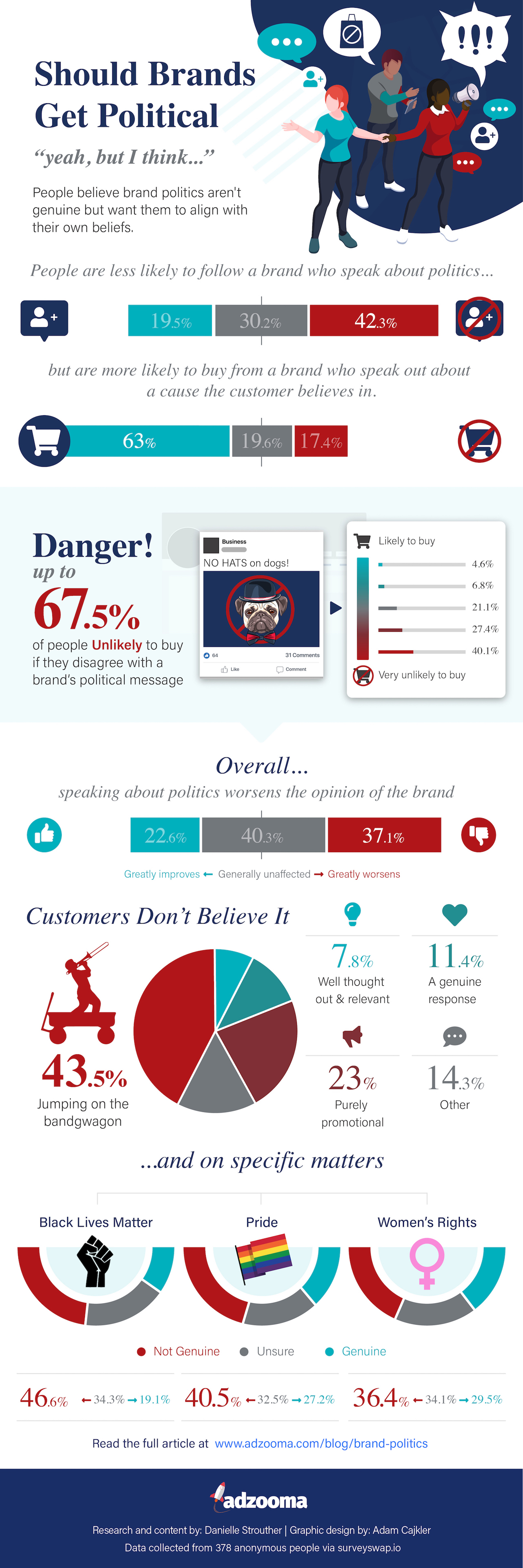
Customers won’t follow but will buy from political brands
The data revealed a rather interesting comparison of customer behaviour when a brand speaks out about politics.
In terms of social media, if a brand makes a political statement:
- 27.5% of people are likely to follow that brand on social media
- 30.2% of people say it doesn’t affect their opinion
- 42.2% of people are unlikely to follow the brand on social media
However, an astounding 63% of people said they are more likely to buy from a brand that speaks out about politics. Only 17.4% of people have said that it will harm their purchasing decisions, showing a net positive for political stands.
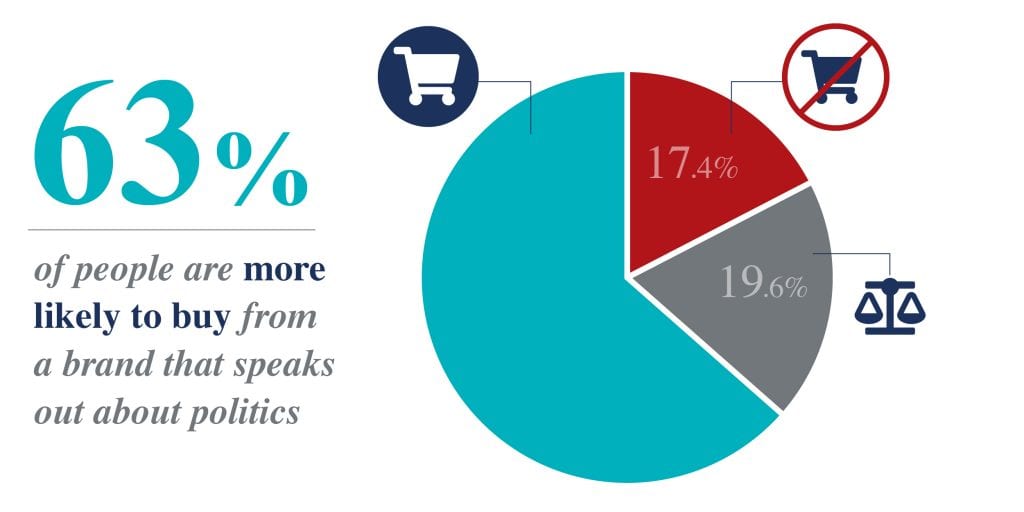
That is however, if it aligns with the customer’s viewpoints.
If a brand makes a statement that a customer doesn’t agree with, 67.5% of people said they wouldn’t buy from them.
Overall, when asked how making political statements affects people’s opinions of brands:
- 22.6% of people said it improves their opinions
- 40.3% of people said it doesn’t affect their opinion
- 37.1% of people said it negatively affects their judgment
So, posting about politics can simultaneously lose followers, customers and negatively impact your reputation. But on the other hand, it can also gain you new customers and more sales.
Ultimately, it depends on what you’re posting and how genuine your customers believe you are.
43.5% of people think brands are just jumping on the bandwagon
“Some companies are just riding the bandwagon. They are just trying to let their target audiences think that they are concerned politically or their brand stands by a social issue but the truth of the matter is they are more concerned about getting their brand out there and get brand awareness from their target audiences.”
Scot J Chrisman, CEO of The Media House
One of the biggest problems with political statements is that people often view them as ingenuine. In fact, our data revealed that 43.5% of people believe political statements are just a way to jump on the bandwagon – a temporary comment to gain attention and fit in with what headline is making the news.
In addition, 23% of people said that political statements are purely promotional. Only 11.4% of people saw political comments from brands as a genuine response.
“I believe there are brands that are genuine when they post. While some can come off as overly self-promotional, many brands still communicate with pure intentions.”
David Foley, Founder of Unify Cosmos
“I for one do not believe that brands are 100% genuine when they post about “supporting” a cause. They only post those things to get more coverage for their brand. There’s only one thing a company wants and that’s getting more money!”
Kenny Trinh, Managing Editor of Netbooknews
A distrust of ‘popular’ movements
“Think a special mention has to go to the brand will change their logos for a few days in response to something and switch back as soon the month is over or the tabloids have changed focus. For me it comes across as jumping in bandwagons to appear like they’re interested in a political/societal cause, so they don’t get ‘cancelled’ or have any bad PR.”
Chris Nunn, Digital PR Consultant
To dive a little deeper into whether people saw political statements as genuine or not, we tested the waters with a few well-known movements and or causes that had been hitting the headlines recently.
It turns out all of them generated a lack of trust.
For Black Lives Matter (BLM):
- Only 19.1% of people believed brand statements to be genuine
- 34.3% of people were on the fence
- 44.6% of people saw them as ingenuine. 22.3% of these people firmly stood by this opinion
For women’s rights movements:
- 30.5% of people believed the statements to be genuine
- 34.1% of people were on the fence
- 26.4% of people thought they were ingenuine
For Pride:
- 27.1% of people believed the statements to be genuine
- 32.5% of people were on the fence
- 40.5% of people thought they were ingenuine
Pride also received the most comments for being an ingenuine and self-promotional statement. Sorry temporary rainbow flags –customers just aren’t buying it.
Part of the reason is that brands who post rainbows misunderstand the core of what Pride is about. It’s not a simple celebration; it’s a movement for equality, a memorial for the silent generation and a loud reminder that LGBTQ+ people exist and deserve to be seen.
The first pride wasn’t a party. It was a riot.
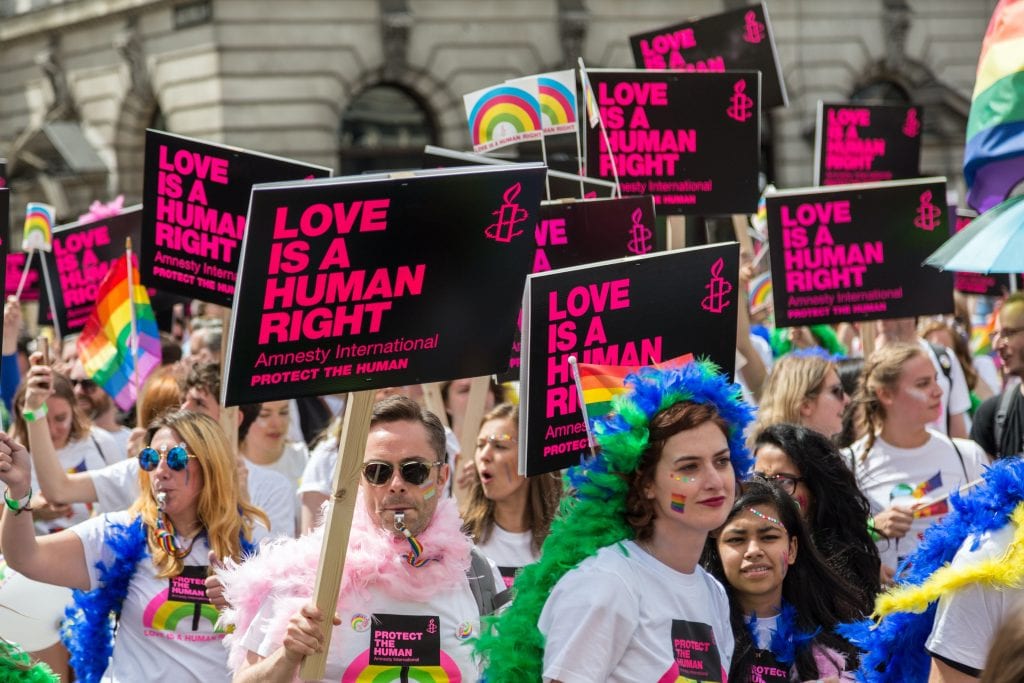
All talk, no action
A reason people view a brand’s political messaging as ingenuine is because statements alone are empty.
A statement is passive. It’s a reflection on an event as if it’s already passed, like something separate. Statements can be deleted, retracted or changed. There’s no accountability to them and no guarantee that anything will change.
Those that take action are much more likely to be viewed positively.
Some companies that got glowing reviews were the ones that took action. For example:
- Square Enix pledged $250,000 to the BLM movement and promised to match any further donations.
- Brewdog used their facilities to make hand sanitiser during the coronavirus lockdown.
- Clothing brand H&M donated a total of $500,000 to NAACP, ACLU and Color of Change organisations in support of BLM.
Action, not talk, is what gets real results and support.
“Taking a stand on certain relevant political issues can show how much the brand cares, not only for their sales but also for the welfare of the entirety of the population.”
Sonya Schwartz, Founder of Her Norm
A political paradox
Samantha Moss, Editor & Content Ambassador at Romantific, told us of two main benefits of brands speaking out about politics.
The first is that you generate an impression that you don’t just care about profits, but what’s going on in the world. The second is that is can build your reputation and “gain new and retain customers that would agree on your stand”.
And that’s a paradox, isn’t it?
Posting about politics simultaneously shows audiences that you’re not in it for the profit while using it as a device that can generate you a profit. No wonder users have a hard time knowing if brands are genuine or not.
“Whether good or bad, it is still publicity. People will still talk about them and that’s what they want. They must be ready to face the consequences, though. Whether people will support or condemn them, they must be prepared.”
Karl Armstrong, Founder of EpicWin App
“Consumers today increasingly expect corporations to demonstrate their values so they can align their spending with companies they believe in. Companies that do take political or social stands do so understanding that it will be net positive — that they’ll attract and retain more customers than they’ll lose.”
Deb Gordon, Author of The Health Care Consumer’s Manifesto
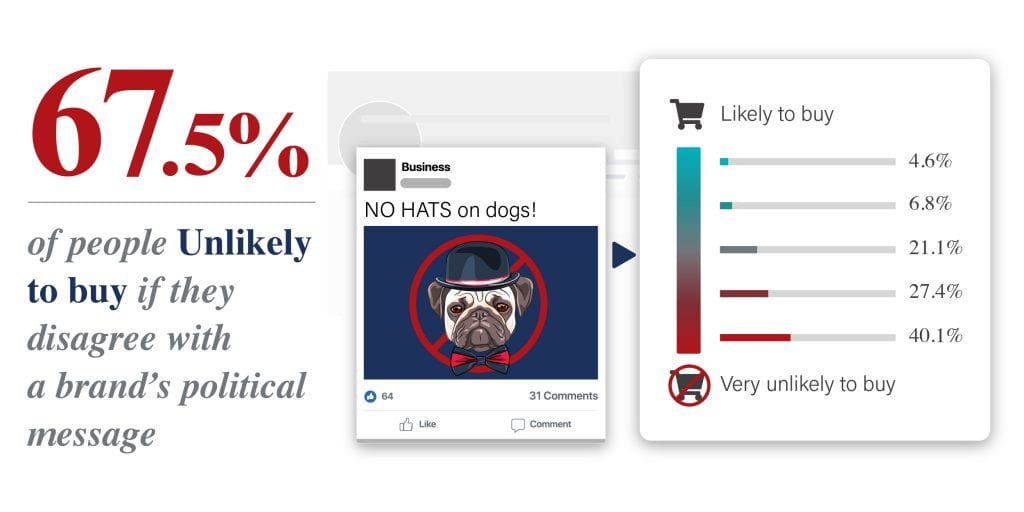
Short-term gains, long-term mistakes
“Brands should never post about politics online. It just takes seconds to post something but records, and its adverse side effects on brand sales remain for a longer time.”
Nicholas Holmes, Founder & CEO of ProductReviewer.
“Although brands have the right to post about politics, I think they should refrain from doing so. Politics is such a grey area that it’s a huge responsibility to incite anything.”
Jeremy Harrison, Founder of Hustle Life
There’s a common thought among the respondents is that once you’ve made a statement, it may come back to bite businesses later down the line.
For example, David Reischer, Marketing Director at Legal Advice stated: “Any company that believes that they hold a monopoly on making the right political decisions and hold a superior moral certitude on these complex matters may be sorely mistaken with the passage of time.”
The problem is the expectation that brands are a stationary, fixed entity. Once a brand has made a message, it will stick by it to be consistent. Brands aren’t seen to grow and change as humans do, so any political statement made has to be true years down the line.
And that’s ridiculous really. If a brand is to post about politics genuinely, then it should be given the benefit of the doubt to keep updated of the situation, keep educating themselves and update their stances when necessary.
“I do believe [brands] are genuine when they post because they are doing so knowing that what they say may cost them customers in the process.
Could it serve as a promotional tool? Maybe – but that’s a risky one, given the likelihood that they’ll alienate at least some of their customer base who don’t share their views.”
Alison Huff, Editor in Chief of Women’s Health Interactive
Strategic statements to please your audience
To Ian Wright, founder of Fleet Logging, political statements should only work “if your brand closely aligns with a certain political group” or cause.
For example, if you sell food products to a predominantly vegan audience, posting political statements prostesting animal warfare will align well with your target audience. This statement is, therefore, another way to appeal to your audience and gain their support.
“No business can hope to ever ‘please all of the people all of the time’, but they do need to strive to please/support/provide value to the people who represent their target audience.If you’re a business that sells firearms, it’s appropriate for you to be visible online in terms of your support for laws and regulations that support the right to bear arms”
Linda Pophal, Strategic Communications LLC
But, that’s a tactic that only works if the majority of your audience share the same political view. If your audience is divided, sometimes staying neutral is the only way to retain both sides, as Matthew Burke, Educational Director of The Complete Guide To Archery tells us.
“We’ve made the decision to forego anything even remotely political, because [it] has been absolutely toxic for us.” Matthew states. “The world of archery is interesting because it is split between two groups who love archery, but who have extremely different politics: the target archery bunch tends to live in larger cities and support liberal ideals, while the bowhunting bunch tends to live in suburban and rural areas and support conservative ideals”.
This divide has meant that even the slightest mention of politics turned comment sections into debates and constant talk of how “the other side was evil / insane / anti-American”, turning a once great community into a war zone.
“Political views [can] ruin your company’s reputation and image which can eventually affect your financial status.”
Jon Howard, CEO of Coupon Lawn
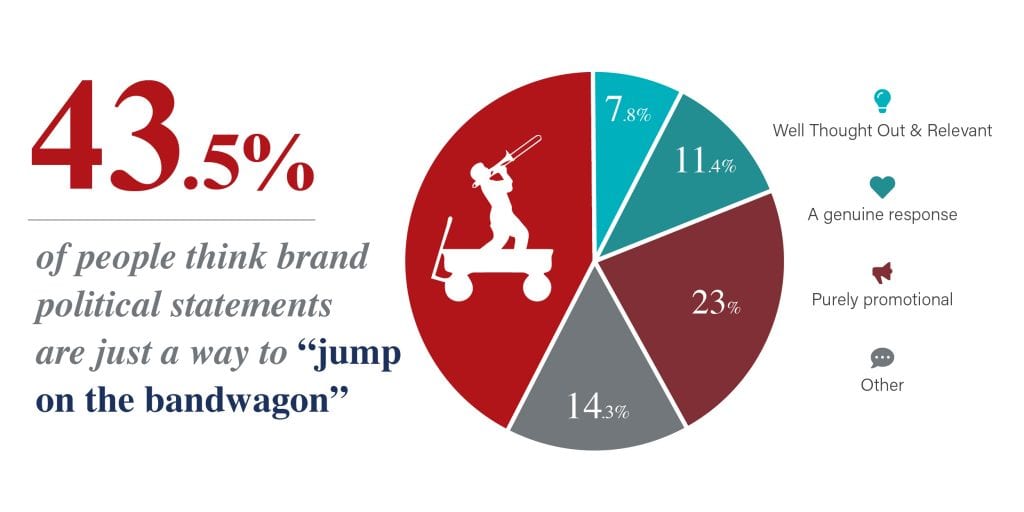
Is there a pressure to speak out?
Dre Baldwin of Dre All Day states that companies are only speaking up about BLM because of outside pressure.
“The momentum of the Black Lives Matter slogan [has] emboldened its staunchest supporters to make demands of companies to show support — or otherwise be labelled racist or anti-equality. Businesses have no choice but to speak up or be ostracised.”
Fear of being losing customers can be a powerful motivator and may have been the reason that some companies have issued statements about BLM. A comment just to fit in has no real meaning or power behind it, contributing to the ingenuine feeling behind them.
“People want brands to speak up because they have a lot of power and influence. They must stand on the right side of history. But I will say, I don’t believe for a second that any of these political posts are made out of genuine support or genuine feeling. Brands are posting about it in an effort not to get “cancelled” or as a PR move. They are absolutely promotional, and you’ll most often notice that they usually do not do anything more to support the cause.”
Sandra Hurley, Operations Manager at Hayden Girls
A thin line between socially conscious and political
“There should always be a boundary on how politically your company is posting.”
John Howard, CEO of Coupon Lawn
There’s a difference between socially conscious and political. One first seems to be widely accepted by users, while the latter is not. But where is the boundary?
How is one post from a company accepted as being socially conscious, and another is radical? Does the boundary happen at the point where the cause dividing opinions or is the action of the statement?
Socially conscious is a very passive statement. It implies that a business is aware of issues, but aren’t actively doing anything about it. Policial, on the other hand, means that a company has taken a stand.
It’s risk-free vs risky.
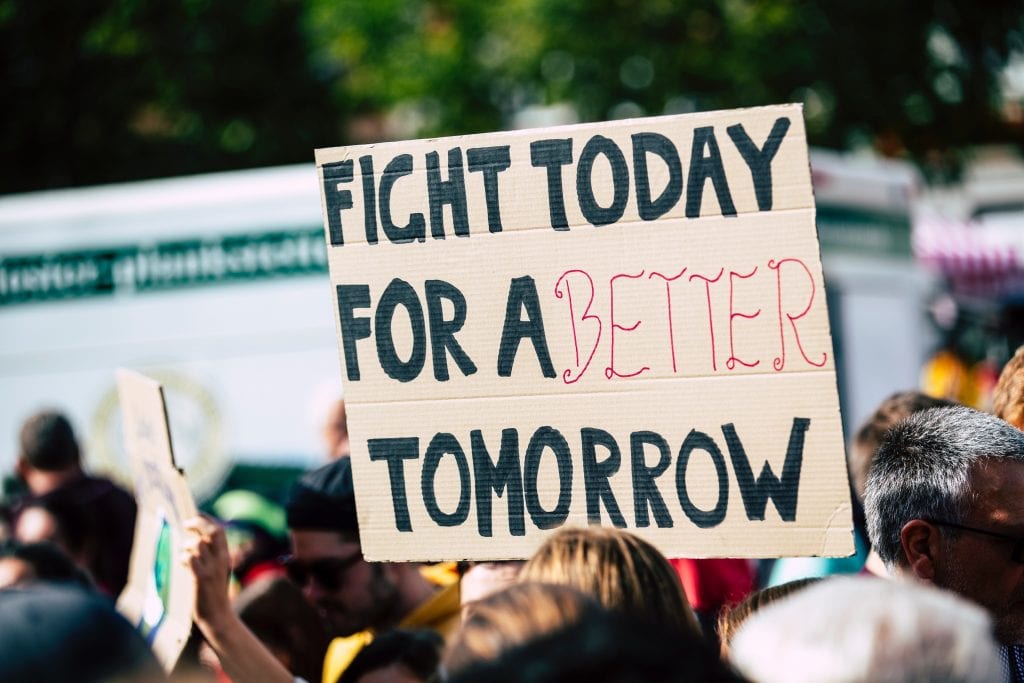
The rise of the socially conscious buyer
“Once you realise the power of your purse, and how shopping habits can steadily and surely push powerful businesses to be more responsible about their political stances, it is not an inconvenience to be mindful of where you spend your mind, but a duty.”
Renata Castro, Castro Legal Group
There’s a new type of consumer emerging: the socially conscious buyer. These are buyers that will only want to spend with brands that align with their own political stance.
Daniel Carter of Zippy Electrics told us that he was an Apple user until he realised how much Samsung sends out to non-profits organisations every year and decided to make the switch. Daniel continued to tell us that this decision was made on their long-term commitment, and not because of a temporary measure. “I think brands who do not put a time limit to their campaigns are a lot more genuine than those who, say, sell rainbow-themed items because it’s Pride month”.
It’s an added feel-good factor. Customers not only get the satisfaction of buying a new product but the added bonus of feeling like they’ve also helped support the cause through their money.
“I find myself not just buying more from brands who speak loudly about these topics but feeling good after each purchase, knowing that some of my money will go into supporting them.”
James Bullard, SoundFro
“I absolutely love it when I see brands speaking out about discrimination. I love it, even more, when I see them sassing ignorant people despite doing their part to educate them. Every time I see something like this happen, my respect for these brands go up, and I just know they at least deserve a follow. However, when I find out that these brands are actually researching deeply into the issues they claim to support and support them unprompted (no matter how quiet the issue is) that’s when I find myself spending money their way. There is a huge difference in supporting a cause for just a month and supporting it for YEARS.”
Aaron Simmons, Test Prep Genie
“I think [brands] should get political, so then I know who I want to give my hard-earned money to or not. As a result, I’m actually quite grateful when brands show their true colours and speak out on what they believe in.”
Annie Harris
“I actively base my shopping decisions around a brand’s public stance on social issues. When news came out that Home Depot’s founder was donating to the Trump campaign while Lowe’s was donating to the community, I drove 20 min. out of the way to shop at Lowe’s instead. Chick-fil-a’s anti-LGBT stance is why I’ve never spent a dime there. And in June, Nordstrom was one of the first brands to publicly take a stance on BLM, which made me more loyal to an already favourite brand.”
Cathy Pedrayes, TV personality
“I am absolutely more likely to buy from a socially conscious brand and actively avoid buying from brands with which I do not agree politically.”
Val Edwards, Owner of P2G Consulting LLC
The politics-blind customer
As well as a socially conscious buyer, there’s another category of consumer. These are people who don’t want to hear about politics at all and will base their purchasing decisions solely on the product itself.
It’s not about being quiet about your political stances here; it’s avoiding making any statement at all.
“Retail is our safe haven, our neutral point of feeling good, supporting us in good times and helping us in bad times. We are inundated with opinions, choices and decisions at every turn. If a brand is hitting a very small market that has a strict political view, that’s different. It’s nice to know that we have a mental ‘Switzerland’ when it comes to left or right. Those who only want to support brands that share their political views can certainly vet those out while the rest of us relax with the brands whose loyalty lies in the quality of their products or services.”
Kimberly Freidmutter, Hypnotherapist and Author.
Staying neutral won’t please both of these customers though. As Brand Strategist Martha Garza states “As a consumer, if a brand is not saying anything it seems fishy to me, and I probably won’t buy until I know where they stand”.
Speaking out about politics will alienate certain customers from your brand, as will staying silent. It’s a minefield out there.
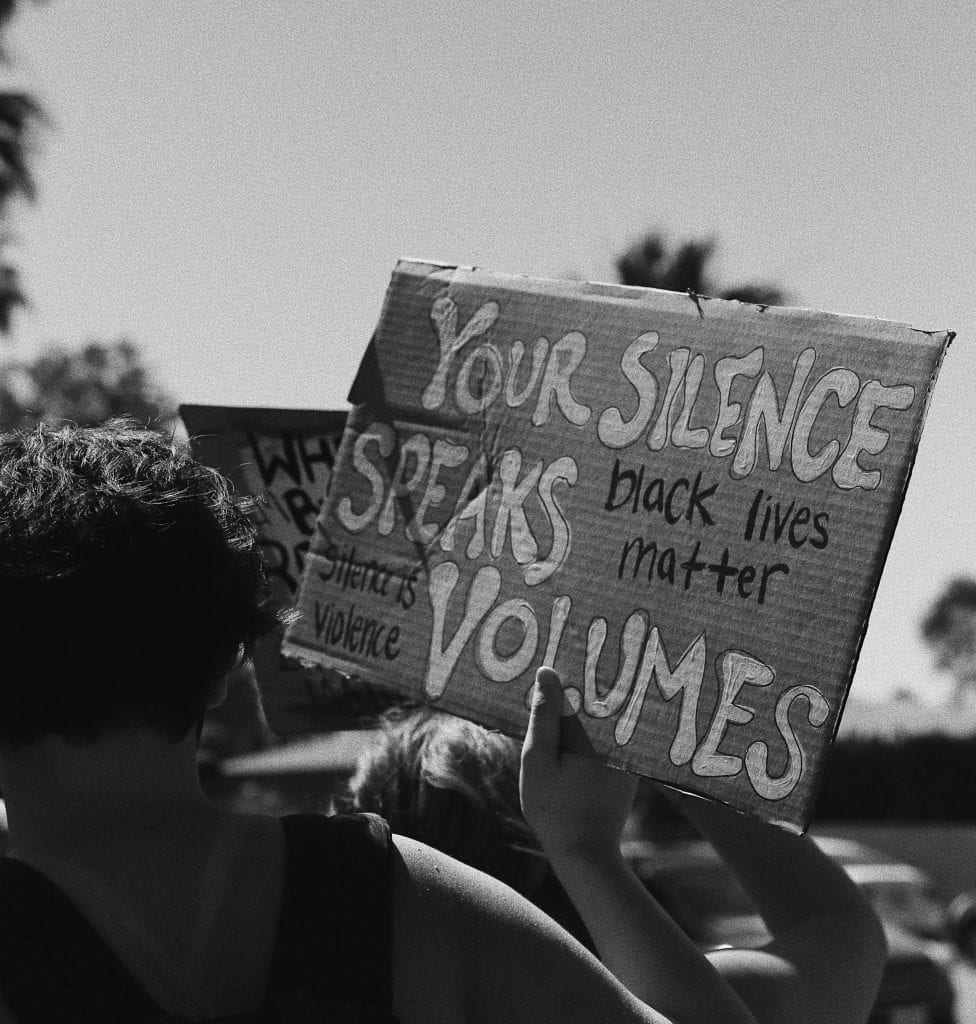
Political statements done right
To see what brand messaging people are relating to, we asked what companies handled political statements positively.
These are just a few of the companies that got a golden mention.
Yorkshire Tea & PG Tips
On Twitter, someone tweeted to celebrate that Yorkshire Tea didn’t support the BLM movement. Yorkshire Tea then replied by telling her not to buy their tea, stating “we’re taking some time to educate ourselves and plan proper action before we post. We stand against racism.”
Another user replied to this saying that they would be buying tea from long-term rivals PG Tips. Instead, the brand replied that they are also in support of BLM and are standing in ‘solidaritea’ with Yorkshire Tea.
Yeah it does suck, Pamela. If you are boycotting teas that stand against racism, you're going to have to find two new tea brands now. #blacklivesmatter #solidaritea
— PG tips (@PGtips) June 8, 2020
It’s a simple statement and one hell of a pun. But, interestingly, it’s gained respect from the brand, considering the political stance wasn’t made as an official statement, but rather as a casual reply.
Libro.Fm
“They’ve been bold, educational and supportive. It’s been amazing to see them, within their lane of audiobooks, get involved in the conversation!”
Jamie Lee, The Perpetual Page-Turner
Libro.fm is an audiobook service which has curated their own playlists and contents promoting books that are written by, or about black or LGBTQ+ authors or issues. By highlighting these playlists, they’ve made it easier for people to educate and support black and LGBTQ+ authors, using their platform to amplify other voices.
It’s more than a statement – it’s an active move to support those around them. In addition, they have an entire page highlighted on their own website with further actions people can take to support black-owned bookstores and authors.
English Premier League
James Jason, Assistant HR Manager and Financial Analyst at Mitrade, states that English Premier League (EPL) has been instrumental in supporting the BLM agenda.
This is through the players taking a bow at the first whistle and displaying the Black Lives Matter tagline in place of their names on their shirts, drawing attention to the movement.
“Being the biggest game on the planet involving players and fans drawn from all over the world, having such a campaign showed that the EPL was deep inside the controversial matter and supported the movement.
This is a great show of solidarity by a brand towards its stakeholders’ concerns.”
Ben & Jerry’s
The ice cream giants Ben & Jerry have built up a reputation of being vocal about politics, including LGBTQ+ rights and climate change. Their support of BLM didn’t come with George Floyd’s death but can be traced back years ago to the Ferguson Unrest, a series of BLM protests that started after Micheal Brown was murdered by police officer Darren Wilson.
In addition to their statement, Ben & Jerry’s have issued a 4 step plan to dismantle white supremacy, including points to disavow white supremacists and increase police accountability. In these points, the company state that we “can’t continue to fund a criminal justice system that perpetuates mass incarceration while at the same time threatens the lives of a whole segment of the population”.
“As a Black man, and straight ally, I am heartened by the authenticity and courage with which B&J is making their anti-racism and anti-bigotry palpable. They’re definitely not “both-siding” or tip-toeing around the systemic injustice present in America. They’re on the side of humanity and history. More brands should follow their lead!”
Eric Blackerby, Artist & Entrepreneur.
Nike
Nike was another brand that took to social with a video that urged viewers not to be silent and to take a stand against white supremacy.
By subverting their slogan into the message ‘Don’t Do It’, Nike’s message manages to place the brand front and centre, arguably ahead of the statement. Yet the video was widely well received and may be partly down to the fact that it isn’t the first time that Nike have shown their support of BLM.
In 2018, Nike made NFL star Colin Kaepernick the star of their advertising campaign. This was a bold move after Kaepernick was outcast and fired from the sport after being the first American football player to take a knee in protest during the national anthem.
“A little bit of research can show you that some brands have been supporting these causes way before it blew up in social media. Those brands, I believe, are genuine.”
Allan Borch, founder of Dotcom Dollar
A note about where Adzooma stands
Just to make it abundantly clear, Adzooma is not afraid to take a political stand. Since our BLM statement last month, we’ve been writing extensively on the top with our Diversity Month, which highlighted societal issues and provided a platform for all to speak out against discrimination.
We’ll be lying if we said that everyone reacted positively to this. I’m not allowed to include details, but trust me when I say there were some spicy emails about the content we’re putting out and a loss of customers.
In this paradoxical political minefield, we choose to take a stand against racism, sexism and discrimination. We support BLM, Pride and all causes to diversify the technology industry. Always.
Methodology
Data was gathered from 378 anonymous respondents via surveyswap.io. No participant was paid for their response, and the survey was made available to people of all backgrounds, ages, genders and ethnicities to avoid any bias in responses.




